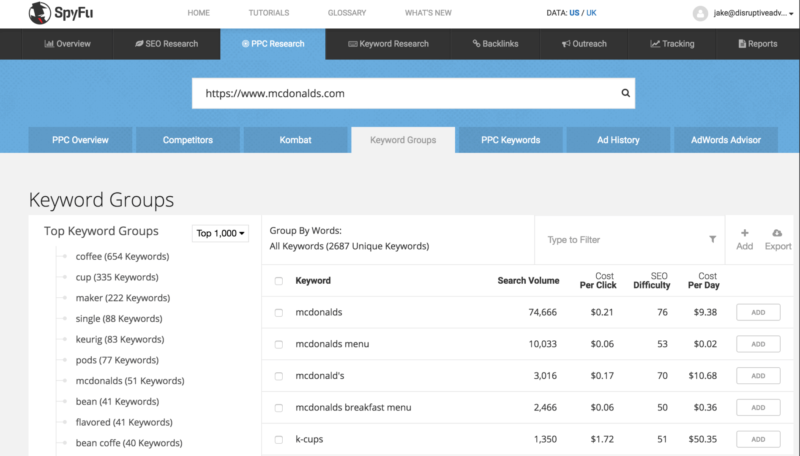Bidding on your competitors’ brand terms could yield positive results, but columnist Jacob Baadsgaard warns that it might cause problems in the long run.

These days, bidding on your competitors’ branded terms has become a common practice for paid search advertisers.
To be honest, the logic behind this trend seems sound. After all, if someone is typing in a competitor’s business name, they are interested in what your competitor has to offer… which means they are probably interested in what you have to offer.
Plus, anyone who is searching for your competition is probably a bottom-of-the-funnel potential customer. They know what their problem is, and they are close enough to buying that they actually know the name of a business that can solve their problem — it just doesn’t happen to be the name of your business.
Round that all off with a lower cost per click (CPC) and the satisfaction that comes from stealing sales from your competitors, and bidding on the competition seems like a great — if not mandatory — idea.
But rather than blindly jump on the branded terms bandwagon, let’s take a step back and ask a simple question: Is bidding on your competitor’s branded terms right for your business?
The high price of bidding on the competition
As compelling as the idea of bidding on the competition’s terms is, in practice, it often backfires.
For example, one of our B2B clients operates in a very competitive market. To try and snag extra business, they had been bidding on a number of their competitor’s branded terms for over a year.
Fighting a bidding war
At first glance, it looked like the tactic was working. Their competitor terms campaign had produced a decent number of leads, and even sales.
But there was a problem.
Their campaign was producing leads and sales, but it had also dropped them into the middle of a branded terms bidding war. As a result, the CPC for their own branded terms had been steadily climbing for more than a year.

Unfortunately, while this client was getting some value from their competitor terms campaign, they got a lot more leads and sales from their own branded terms campaign.
And, thanks to their competitor terms campaign, the CPC for their own branded terms campaign was 1,256 percent higher than it used to be.
More importantly, they were paying 14X more per sale.
Clearly, the competitor branded terms campaign was driving value for our client, but did that value outweigh the damage our client’s own branded terms campaign was taking?
Not even close.
Calling for a cease-fire
Now, it occurred to us that if our client’s business was suffering this much from this bidding war, our client’s competitors were probably hurting pretty badly, too.
So we decided to try calling for a cease-fire. We called our client’s competitors and offered them a deal: Our client would stop bidding on the competition’s branded terms, as long as the competition would stop bidding on our client’s branded terms.
(Editor’s Note: Such agreements, at least some forms of them, are in the Federal Trade Commission’s crosshairs as evidenced by the — as yet undecided — 1-800-Contacts case, so you’d be advised to get your own legal advice.)
To be honest, I wasn’t exactly sure how this sort of call would go, but as we talked things out with the client’s competitors, it quickly became apparent that this bidding war was hurting everyone.
Although bidding on the competition had seemed like a good idea, no one was getting enough value from it to justify the hit they were taking on their own branded terms.
It took a few months to get everyone on board, but once the cease-fire was in place, our client’s branded terms’ CPC had dropped 83 percent.

More significantly, their cost per sale dropped by 78.4 percent!
Now, our client wasn’t getting sales from their competitor’s branded terms anymore, but since those sales cost 10X more than their new branded terms’ cost per sale, this cease-fire significantly improved the performance of their account.
When does it make sense to bid on the competition?
Obviously, bidding on your competition’s branded terms isn’t always a great idea.
However, while calling for a cease-fire worked out well for this particular client, there are also times when bidding on the competition can be great for your business.
The question is, when is bidding on the competition a smart move? Consider the following:
Does the potential value justify the cost?
Often, I’ve heard business owners say that they want to bid on their competitors simply because they want to hurt their competition.
But here’s the thing: Advertising in pursuit of a vendetta is a great way to lose a lot of money.
Low Quality Score
The folks over at Google and the other search engines are smart. They know that if someone searches for “Chipotle near me,” they probably aren’t very interested in McDonald’s.
Since Google’s reputation is based on the quality of its search results, it’s in Google’s best interest to deliver relevant results — even if that means they don’t display as many ads.
Guess what? If you’re bidding on the competition, your ad isn’t going to be very relevant; in all likelihood, Google will penalize you with a low Quality Score. And the lower your Quality Score, the higher your cost per click.
So, even if the other company doesn’t retaliate at all, you can expect to pay a lot for every click you get off their branded terms.
But if the search and click volume is high enough, and the CPC isn’t too astronomical, bidding on the competition just might be worth it.
Researching traffic volume
The good news is, it’s not hard to get a feel for how many searches and clicks your competitors are getting using a competitive analysis tool like SpyFu or iSpionage (Note: I have no business interest in SpyFu or iSpionage).
Simply type in a competitor’s domain, click on “PPC Research,” then select the “Keyword Groups” tab to see the keywords they are bidding on.
For example, here’s what comes up when I enter the URL for the McDonald’s website:

Once you find their branded terms, you can see their search and click volume.
A company with thousands of branded term searches every month may be worth bidding on. A company with fewer than 200 to 300 searches per month may not be worth the effort.
If, like many companies, their search volume falls somewhere in that range, it’s often a good idea to compare your competitor’s search volume to your own.
If you get a lot more searches and clicks than your competitor, bidding on them isn’t going to do you much good. On the other hand, if they get a lot more traffic than you do, it might be a good idea to try and snag a bit of that traffic for yourself.
How does your industry view branded term bidding?
Even if you think that bidding on the competition can deliver real value for your business, you still might want to avoid it if your industry frowns on branded term bidding.
In some industries, everyone bids on everyone else — whether it’s smart or not, everyone expects it. In other industries, bidding on your competitors may be virtually unheard of.
Of course, any company will probably be irritated if your ad shows up on their branded terms, but some industries (legal, for example) get very upset if you bid on their brand.
The easiest way to get a feel for how your industry views branded term bidding is to try searching for your competitor’s branded terms. If someone else is already bidding on their terms, you’re probably safe tossing your hat in the ring.
Of course, if no else is bidding on their branded terms, you might just have uncovered an untapped marketing opportunity, too — so this decision is ultimately a judgement call on your part.
Can you take the backlash?
Finally, as you can see from my client’s story, advertising on your competition’s branded terms is a good way to start a bidding war with your competitors.
That might not be a war you can win.
At a minimum, if you’re going to bid on the competition, you should be bidding on your own branded terms. If you don’t, you’re almost guaranteed to find a competitor’s ad sitting on top of the organic results for your branded terms.
Once you know your CPC and click volume for your branded terms, you need to decide whether your business can handle the increased CPC that comes from being involved in a bidding war.
As a rule of thumb, if you can’t take a 2X to 5X increase in the CPC of your own branded terms, it’s probably not worth it to start a bidding war.
However, if you don’t get a lot of traffic from your branded terms, a 2X to 5X (or much higher) increase in your CPC may not make a big difference to your business.
In this situation, bidding on the competition may be a great way to build your business and get your name out there.
Conclusion
In general, bidding on the competition tends to favor smaller companies without an established brand. Nobody knows who you are, so you can piggyback on the competition’s name without putting yourself at much risk.
However, for many companies, bidding on the competition can be a bit of a two-edged sword. It can yield great results for your business, but it can also end up causing problems for you in the long run.
[Article on Search Engine Land.]
Some opinions expressed in this article may be those of a guest author and not necessarily Marketing Land. Staff authors are listed here.
Marketing Land – Internet Marketing News, Strategies & Tips
(131)
Report Post




